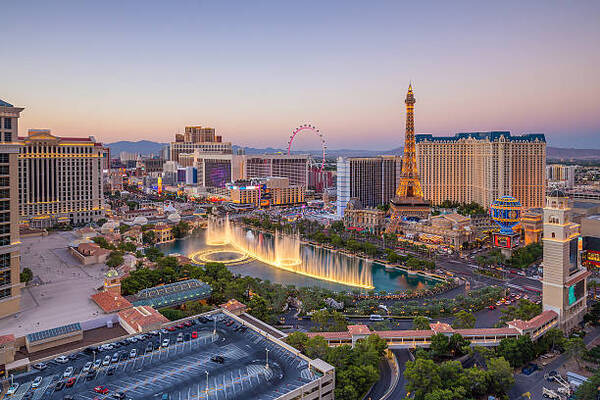Las Vegas Faces Economic Challenges as Tourism Declines
Las Vegas, the iconic city known for its bright lights and bustling entertainment, is currently grappling with its most severe downturn since the 2008 financial crisis. As tourism falters, the city’s signature Strip feels more subdued than ever, raising concerns for local businesses and the greater economy. This article dives deep into the factors contributing to Las Vegas’s current struggles and the implications for the future.
Declining Visitor Numbers
The numbers are striking: Las Vegas has seen an 8% drop in visitor numbers, with hotels facing occupancy rates that remind many of a different era. Average hotel costs have also taken a hit, now sitting at approximately $193 per night, down from $204 the previous year. The diminished foot traffic on the Strip, usually alive with tourists, reflects a cautious approach to spending among American families who once flocked to the renowned casinos and shows.
The Impact of Rising Costs
A significant factor influencing this decline is the rising cost of travel. Factors such as inflation and increased interest rates have tightened budgets for many Americans, leading to a reduced appetite for leisure travel. Dining out, lodging, and entertainment expenses have all surged, forcing families to reconsider extravagant weekend getaways. What was once an affordable escape has become a luxury for many, leaving Las Vegas and its vibrant offerings feeling out of reach.
The Decrease in International Visitors
Adding to the local struggles, international tourist arrivals have also dwindled, with flights from overseas markets declining by 10%. Even regional traffic from nearby states like California is not resilient enough to fill the void left by absent tourists. This downturn in visitors has profound implications for an economy heavily reliant on tourism-related revenue, pressing local businesses to resort to discounts and enticing packages in hopes of attracting travelers back to the city.
Effects on Casinos and Local Businesses
Casinos, the lifeblood of Las Vegas, are also bearing the brunt of this downturn. Game tables and slot machines are seeing less action, leading some establishments to reduce operating hours and cut back on staff. The ripple effects extend to restaurants, shops, and entertainment venues reliant on a steady flow of clientele. Creative promotions have emerged as businesses seek innovative ways to recapture the interest of the dwindling tourist population. However, the path to recovery remains uncertain.
Broader Economic Implications
Experts suggest that the current slump in Las Vegas could signal broader economic challenges. A decline in tourism within such a leisure-centric city often indicates a downturn in consumer spending across the nation. The interwoven nature of Las Vegas’s tourism and the livelihoods of thousands in the hospitality and retail sectors highlights just how interconnected local economies can be. The repercussions of this downturn may not only influence the trajectory of Las Vegas but could potentially ripple across other cities and sectors.
Potential for Recovery
While the current situation is concerning, the prospect of recovery is not wholly bleak. Significant conventions and events, which draw large crowds to Las Vegas, may provide a lifeline in the coming months. The ability of the city to bounce back largely hinges on the resumption of international tourism and consumer confidence. As long as potential travelers remain uncertain, Las Vegas’s economic revival will hang in the balance.
Vulnerability of Entertainment-Driven Economies
Las Vegas’s predicament sheds light on a broader vulnerability afflicting entertainment-driven economies. Rising costs and cautious consumer behavior can create a downturn that extends well beyond just the Strip. As consumers shift their spending habits, the consequences become evident across numerous industries, signaling the need for a strategic reevaluation.
Strategies for Stabilization
In light of these challenges, experts remain hopeful that targeted promotions, discounts, and value-added packages may provide short-term stability to the market. By eliminating hidden fees and creating all-inclusive offers, businesses might coax tourists into reconsidering trips to Las Vegas. Such strategies could be pivotal, particularly during the traditionally quieter months as the city navigates its current economic landscape.
Future Outlook
The future of Las Vegas as a tourist destination will depend heavily on two interconnected factors: the broader economic climate and the trust consumers place in their ability to spend on leisure activities. If both factors align positively, Las Vegas may slowly regain its footing. For now, however, it stands at a crossroads, as businesses and tourists alike adapt to an uncertain future filled with both challenges and opportunities.
